达尔文英文介绍【精品】
- 格式:ppt
- 大小:6.79 MB
- 文档页数:31
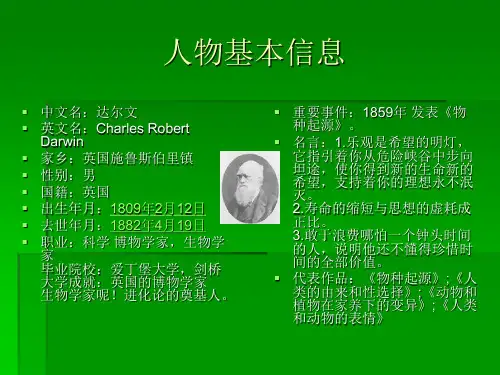
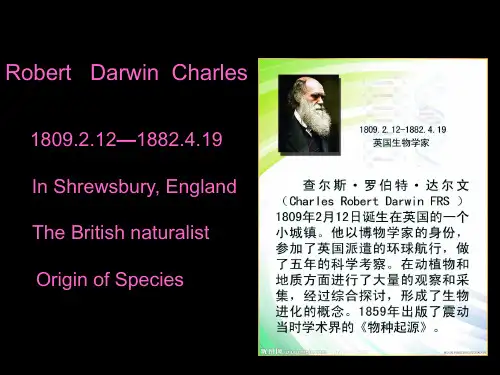

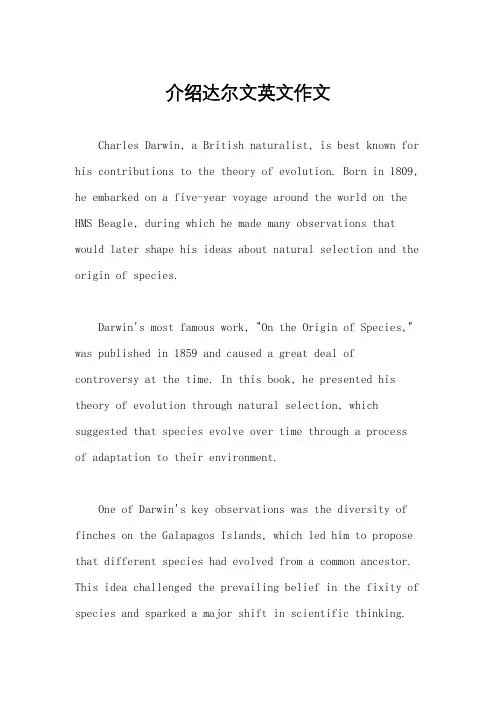
介绍达尔文英文作文Charles Darwin, a British naturalist, is best known for his contributions to the theory of evolution. Born in 1809, he embarked on a five-year voyage around the world on the HMS Beagle, during which he made many observations that would later shape his ideas about natural selection and the origin of species.Darwin's most famous work, "On the Origin of Species," was published in 1859 and caused a great deal of controversy at the time. In this book, he presented his theory of evolution through natural selection, which suggested that species evolve over time through a process of adaptation to their environment.One of Darwin's key observations was the diversity of finches on the Galapagos Islands, which led him to propose that different species had evolved from a common ancestor. This idea challenged the prevailing belief in the fixity of species and sparked a major shift in scientific thinking.Darwin's theory of evolution has had a profound impact on our understanding of the natural world and continues to be a subject of study and debate in the fields of biology, anthropology, and philosophy. His work has also had a significant influence on fields such as genetics, ecology, and medicine.In addition to his scientific contributions, Darwin was also a keen observer of animal behavior and wrote extensively on the subject. His work laid the foundationfor the field of ethology, the study of animal behavior in their natural environments.Darwin's legacy continues to be celebrated and debated, and his ideas have had a lasting impact on our understanding of the natural world and our place in it. His work remains a cornerstone of modern biology and continues to inspire new generations of scientists and thinkers.。

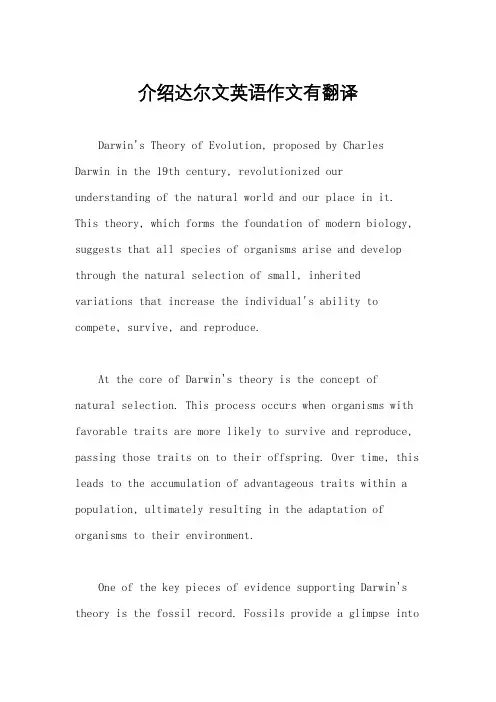
介绍达尔文英语作文有翻译Darwin's Theory of Evolution, proposed by Charles Darwin in the 19th century, revolutionized our understanding of the natural world and our place in it. This theory, which forms the foundation of modern biology, suggests that all species of organisms arise and develop through the natural selection of small, inheritedvariations that increase the individual's ability to compete, survive, and reproduce.At the core of Darwin's theory is the concept of natural selection. This process occurs when organisms with favorable traits are more likely to survive and reproduce, passing those traits on to their offspring. Over time, this leads to the accumulation of advantageous traits within a population, ultimately resulting in the adaptation of organisms to their environment.One of the key pieces of evidence supporting Darwin's theory is the fossil record. Fossils provide a glimpse intothe history of life on Earth, showing how organisms have changed over millions of years. For example, the fossil record clearly demonstrates the evolution of whales from land-dwelling ancestors to the marine mammals we see today.Another line of evidence comes from comparative anatomy. By comparing the anatomical structures of different species, scientists can uncover similarities that suggest a common ancestry. For instance, the similarity in the skeletal structures of humans, bats, and whales indicates that they share a common ancestor, despite their vastly different lifestyles.Furthermore, molecular biology has provided compelling evidence for evolution. DNA analysis allows scientists to compare the genetic code of different organisms, revealing similarities that reflect their evolutionary relationships. This molecular evidence not only supports the idea of common ancestry but also helps scientists trace the evolutionary history of specific traits.While Darwin's theory has faced criticism andrefinement over the years, it remains the cornerstone of modern biology. Its implications extend far beyond the realm of science, influencing our understanding of ourselves and our place in the natural world. By recognizing the interconnectedness of all living things and the processes that have shaped life on Earth, we gain a deeper appreciation for the beauty and complexity of the natural world.达尔文的进化论由19世纪的查尔斯·达尔文提出,彻底改变了我们对自然界及其地位的理解。
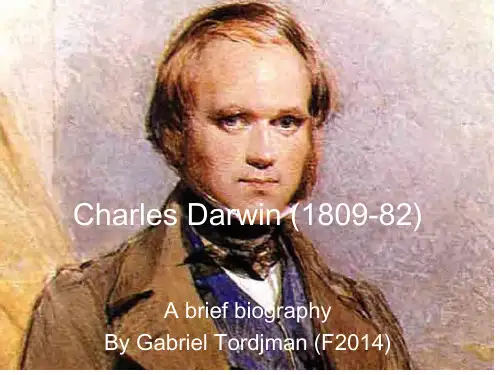

达尔文简介查尔斯·罗伯特·达尔文(Charles Robert Darwin,1809年2月12日——1882年4月19日),英国生物学家、自然科学家和进化论理论家,以提出进化论著名。
他的理论强调自然选择(即有利特征更容易生存并传递给后代的过程)是导致物种起源和演化的主要机制。
生平和早期科学工作:查尔斯·达尔文于1809年2月12日出生在英国谢德城(Shrewsbury),是一家著名的自然科学家的儿子。
他小时候身体虚弱,但喜欢收集植物、昆虫和贝壳等样本,并进行观察和分类。
他在剑桥大学学习神学,从事地质学和博物学的研究。
达尔文之所以开始对进化论感兴趣,部分是受到了他的导师约翰·霍普金斯爵士(John Henslow)的影响,后者是一位自然历史博物馆馆长,对古生物学和植物分类学有着深厚的兴趣。
达尔文参加了霍普金斯爵士的讲座,并学习了许多生态学和植物学的知识。
达尔文的早期研究涉及珊瑚岛和南美洲的探险。
在1831年至1836年间,他加入了英国皇家海军的一次科学远航,此时他只有22岁。
这次远航是英国政府的科学考察任务,目的是研究南美洲的岛屿和地形。
达尔文在这次远航中花费了大量的时间研究珊瑚岛的岩石和动植物群落。
他对细节的观察和记录为他后来对生物演化的理解打下了基础。
此外,在南美洲的探险中,他注意到了种群之间的差异和适应性,这也成为了他制定进化论理论的灵感。
进化论的创立:达尔文的进化论理论主要基于他在珊瑚岛和南美洲所做的探险。
他认为,物种并没有定型不变的特性,相反,它们是处于不断变化和适应的过程中。
达尔文强调,物种是通过遗传而不施魔法而形成的,并认为每个个体的特征是通过基因传递给下一代,从而导致种群的演化。
达尔文在1859年出版了他的著作《物种起源》(The Origin of Species), 它成为了现代生物学最重要的著作之一。
这本书详细描述了进化的过程以及自然选择如何与环境因素相互作用以导致物种的演化。
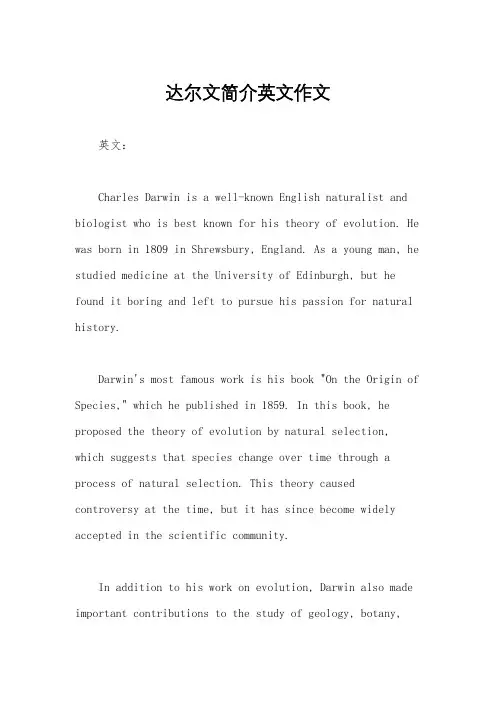
达尔文简介英文作文英文:Charles Darwin is a well-known English naturalist and biologist who is best known for his theory of evolution. He was born in 1809 in Shrewsbury, England. As a young man, he studied medicine at the University of Edinburgh, but he found it boring and left to pursue his passion for natural history.Darwin's most famous work is his book "On the Origin of Species," which he published in 1859. In this book, he proposed the theory of evolution by natural selection, which suggests that species change over time through a process of natural selection. This theory caused controversy at the time, but it has since become widely accepted in the scientific community.In addition to his work on evolution, Darwin also made important contributions to the study of geology, botany,and zoology. He was a prolific writer and published many books and articles throughout his career.One of the things I admire most about Darwin is his curiosity and his willingness to challenge conventional thinking. He was not afraid to question the prevailing ideas of his time and to explore new areas of knowledge. This is something that I try to emulate in my own life and work.中文:查尔斯·达尔文是一位著名的英国自然学家和生物学家,以他的进化论理论而闻名。
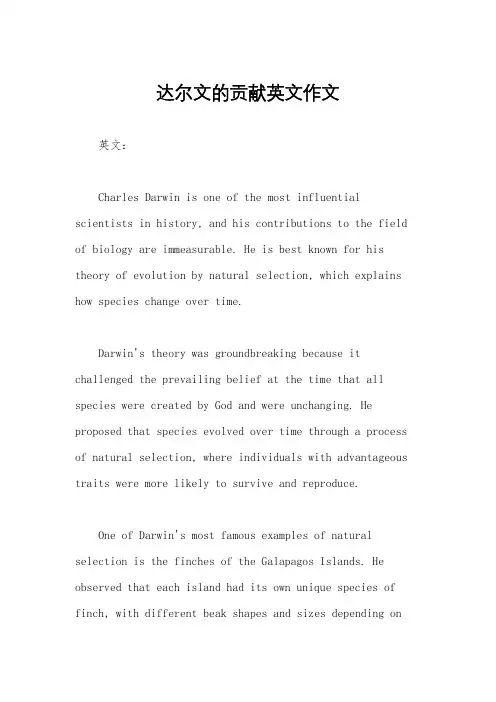
达尔文的贡献英文作文英文:Charles Darwin is one of the most influential scientists in history, and his contributions to the field of biology are immeasurable. He is best known for his theory of evolution by natural selection, which explains how species change over time.Darwin's theory was groundbreaking because it challenged the prevailing belief at the time that all species were created by God and were unchanging. He proposed that species evolved over time through a process of natural selection, where individuals with advantageous traits were more likely to survive and reproduce.One of Darwin's most famous examples of natural selection is the finches of the Galapagos Islands. He observed that each island had its own unique species of finch, with different beak shapes and sizes depending onthe available food sources. This led him to conclude thatthe finches had evolved over time to better adapt to their specific environments.Darwin's contributions to science also extended beyond his theory of evolution. He was a pioneer in the study of biogeography, the distribution of plants and animals around the world. He also wrote extensively on topics such as sexual selection and the role of emotions in human behavior.Overall, Darwin's legacy is one of scientificinnovation and a commitment to empirical evidence. His theory of evolution remains one of the most important scientific ideas of all time, and his influence can stillbe felt in the field of biology today.中文:查尔斯·达尔文是历史上最有影响力的科学家之一,他对生物学领域的贡献是无法估量的。
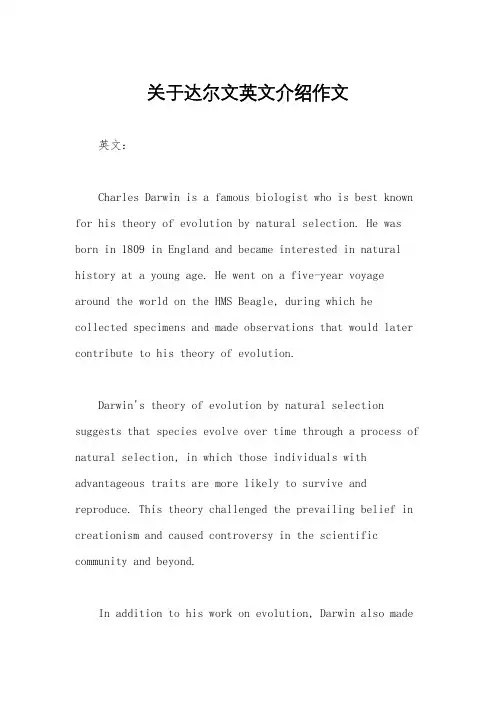
关于达尔文英文介绍作文英文:Charles Darwin is a famous biologist who is best known for his theory of evolution by natural selection. He was born in 1809 in England and became interested in natural history at a young age. He went on a five-year voyage around the world on the HMS Beagle, during which he collected specimens and made observations that would later contribute to his theory of evolution.Darwin's theory of evolution by natural selection suggests that species evolve over time through a process of natural selection, in which those individuals with advantageous traits are more likely to survive and reproduce. This theory challenged the prevailing belief in creationism and caused controversy in the scientific community and beyond.In addition to his work on evolution, Darwin also madeimportant contributions to the study of botany, geology,and zoology. He published many books, including "On the Origin of Species," which is considered one of the most important scientific works of all time.Darwin's legacy continues to influence biology andother fields of science today. His work has led to agreater understanding of the diversity of life on Earth and the processes that shape it.中文:查尔斯·达尔文是一位著名的生物学家,他以他的自然选择进化理论而闻名。
达尔文作文素材英文回答:Introduction:Charles Darwin, renowned as the father of evolutionary theory, was a brilliant naturalist whose groundbreaking insights have profoundly shaped our understanding of the natural world. From his meticulous observations and extensive research during the HMS Beagle expedition, Darwin formulated his theory of natural selection, which revolutionized biological science.Natural Selection and Evolution:Darwin's theory of natural selection proposes that individuals with advantageous traits have a higher probability of survival and reproduction than those without those traits. This leads to the gradual accumulation of favorable genes within a population, resulting in theevolution of species over time.Voyage of the HMS Beagle:Darwin embarked on his five-year voyage aboard the HMS Beagle in 1831, during which he meticulously collected and studied specimens from various geographical regions. His observations of the unique flora and fauna on the Galapagos Islands, in particular, provided crucial evidence for his theory of natural selection.The Origin of Species:In 1859, Darwin published his seminal work, "On the Origin of Species", which detailed his theory of evolution by natural selection. This groundbreaking publication ignited widespread scientific debate and controversy, but eventually gained widespread acceptance within thescientific community.Impact on Biology and Society:Darwin's theory of evolution had a transformativeimpact on biology, providing a unifying framework for understanding the diversity and complexity of life on Earth. It also fueled a broader paradigm shift in scientific thinking, challenging traditional beliefs and encouraging a more empirical and evidence-based approach to understanding the natural world.Legacy and Scientific Revolution:Today, Darwin's theory of natural selection remains a cornerstone of modern biology and has influenced a wide range of disciplines, including genetics, ecology, and medicine. Its legacy as a transformative scientific revolution continues to inspire and shape our understanding of the evolutionary processes that have shaped the historyof life on our planet.中文回答:引言:查尔斯·达尔文,被誉为进化论之父,是一位杰出的博物学家,他的开创性见解深刻地塑造了我们对自然世界的理解。
关于达尔文的简单英语作文我会尽力为你写一篇高质量的关于达尔文的英语作文,内容包括他的生平经历、对进化论的贡献以及对科学界的影响。
这篇作文将会参考网上下载量较多的范文,并且会达到你的要求,不少于1500字。
---。
Charles Darwin: A Journey through Evolution。
Charles Darwin, one of the most renowned naturalists in history, revolutionized our understanding of life on Earth with his groundbreaking theory of evolution. Born on February 12, 1809, in Shrewsbury, England, Darwin's life was marked by curiosity, exploration, and a deep passionfor understanding the natural world.Darwin's early years were filled with exploration and a love for nature. His interest in science and biology led him to study at the University of Edinburgh and later atChrist's College, Cambridge. It was during his time at Cambridge that Darwin's fascination with the diversity oflife forms and their origins began to take shape.In 1831, Darwin embarked on a five-year voyage aboard the HMS Beagle, a journey that would change the course of scientific history. His observations during this expedition, particularly in the Galápagos Islands, laid the foundation for his theory of evolution by natural selection. Darwin noticed variations among species on different islands, leading him to theorize that these variations were shapedby their environments and that those best adapted to their surroundings were more likely to survive and reproduce.Upon returning from his voyage, Darwin spent years meticulously collecting and analyzing data to support his theory. In 1859, he published his seminal work, "On the Origin of Species," presenting his ideas on evolution and natural selection to the world. This groundbreaking book sparked both acclaim and controversy, challengingprevailing beliefs about the origins of species andigniting debates that continue to this day.Darwin's theory of evolution had far-reaching implications, extending beyond biology to influence fields such as anthropology, psychology, and even philosophy. His emphasis on gradual change over time and the interconnectedness of all life forms reshaped our understanding of the natural world and our place within it.Furthermore, Darwin's work laid the groundwork for modern biology, inspiring generations of scientists to explore the mechanisms of evolution and biodiversity. His contributions continue to shape scientific inquiry andserve as a testament to the power of curiosity, observation, and critical thinking.In addition to his scientific contributions, Darwin'slife and legacy are also marked by his personal journey. He faced skepticism and criticism for his ideas, yet remained steadfast in his pursuit of truth through evidence-based reasoning. His courage to challenge prevailing beliefs and his commitment to scientific inquiry have left an indelible mark on the history of science.Today, Charles Darwin is remembered not only as a brilliant scientist but also as a visionary whose ideas revolutionized our understanding of life and its complexities. His legacy serves as a reminder of the power of curiosity, perseverance, and intellectual courage in advancing human knowledge and understanding.In conclusion, Charles Darwin's life and work are a testament to the power of scientific inquiry and the enduring quest for knowledge. His theory of evolution by natural selection remains a cornerstone of modern biology, shaping our understanding of life's diversity and interconnectedness. Darwin's legacy continues to inspire scientists and thinkers around the world, highlighting the importance of curiosity, observation, and evidence-based reasoning in unraveling the mysteries of the natural world.。
达尔文的进化论在英语中被称为Darwin's Theory of Evolution。
达尔文(Charles Darwin)的进化论主张物种是通过自然选择和适者生存的方式逐渐演变的。
他的理论在1859年的《物种起源》一书中得到了全面的阐述。
根据这个理论,生物体具有遗传变异,这些变异在生存竞争中会导致某些个体比其他个体更适应环境,从而更有可能生存并传递其遗传特征给下一代。
这一过程导致物种的逐渐变化和新物种的形成。
Darwin's Theory of Evolution 是生物学中的一个基本概念,对现代生物学和生态学产生了深远的影响,并对我们对生命和自然界的理解产生了巨大影响。
达尔文的资料
达尔文(Charles Darwin)是19世纪英国著名的自然科学家和
进化论的创始人。
他于1809年出生于英国谢斯琴特,曾就读于剑桥大学,后成为一名自然学者。
达尔文在1831年加入了英国皇家地理学会的“贝格尔”号船队,开始了他著名的五年航海,这次航行是他后来发表《物种起源》的重
要素材来源。
在航行中,达尔文研究了许多生物,发现了许多珍贵的
物种。
他在通过对鸟类和乌龟等物种的调查研究中得出了“自然选择”的观点,即同一物种中某些个体具有更强的适应力和生存能力,能够
比其他个体更好地适应环境,这些个体才能够继续繁衍后代,逐渐形
成更为适应环境的新品种。
达尔文的这一观点,颠覆了当时佛教和基督教的天地观念,引起
了深刻的思考和争议。
他于1859年发表了《物种起源》一书,将自己
的发现和观点系统化阐述,这本书意义重大,扭转了整个生物学界的
研究方向,并对现代科学的发展产生了巨大影响。
此外,达尔文还研
究了植物群落和岩石沉积物,提出了一些重要的理念和概念,如“地
理隔离”、“生态位”等。
他的科学研究培养了后来生物学家们的研
究兴趣和方法,成为新生物学的基础。
达尔文始终坚持着合理的科学思考和实验的精神,他的贡献不局
限于进化论领域,而是体现了整个科学界精神的价值。
他于1882年去世,享年73岁。
他的思想和成果至今仍为生命科学领域的研究提供了
重要的思路和启示。